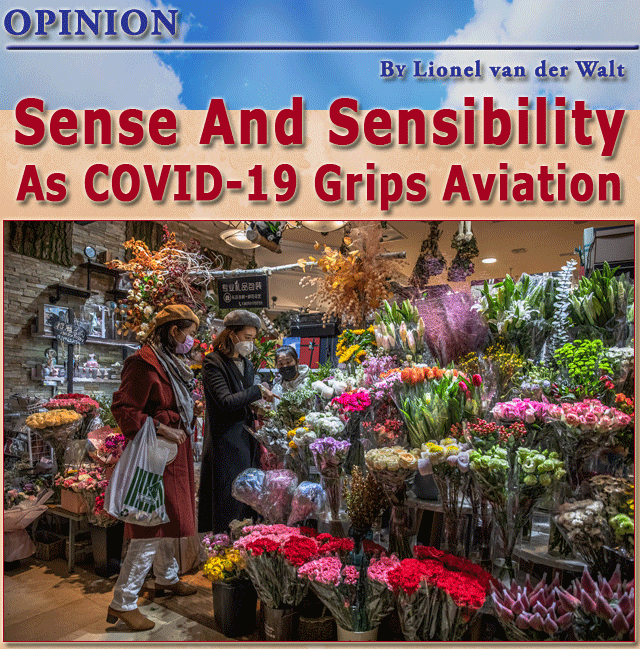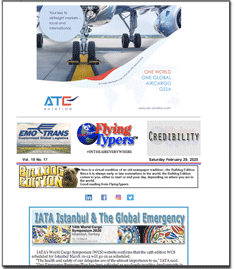
Face masks amongst the flowers at Sanlitun Center
in Beijing, Sunday March 8, International Women's Day.
The World Health Organization (WHO) in their latest report
said that 101,927 cases of COVID-19 have been confirmed globally,
of which 80,813 were confirmed inside China with 3,073 deaths so far. |
Despite all the negative impact
and disruption of the current COVID-19 outbreak, we as
business leaders need to adopt a levelheaded approach to navigate and
lead our teams through the complexities of this challenging time. This
is easer said than done though!
The biggest challenge we face appears to
be how to make sense of fact versus sentiment. Much of this challenge
is being driven by a relentless onslaught of media coverage that by virtue
of their business objectives are competing for public attention; an objective
that in many cases is best achieved by focusing on aspects that drive
fear. The media is not the only one at fault though; we as humans, like
moths to a flame, are uncontrollably drawn to such excitement and hype,
the danger being that we take these reports at face value versus taking
the time to investigate further, debate and develop our own informed opinions.
With the above said, I must admit that the
current situation we find ourselves in is not as clear cut as one would
like. There is no apparent simple answer to questions such as if we should
stop travelling for business and attending or hosting conferences. This
beast has many facets that need to be taken into consideration.
According to the Word Health Organization
the restriction of the movement of people and goods during public health
emergencies is ineffective in most situations. The organization provides
some general guidelines that holds true for both international and domestic
travel. The key advice being that if you are ill you should avoid travel
and the same holds true “in particular for elderly travellers and
people with chronic diseases or underlying health conditions”. They
also provide some general guidelines, which as a seasoned traveler I find
a bit puzzling, as they are almost impossible to follow at times e.g.
“keeping a distance of at least one metre from persons showing symptoms”.
This is challenging in airport environments e.g. when lined up for security,
customs, boarding your flight etc., and when seated in planes, especially
in planes, where cabin air is being circulated; one sneeze or cough and
surrounding passengers are most probably impacted.
To further complicate the matter, an infected
individual may be in an incubation phase and not display any symptoms.
There is therefore no guarantee, even if you do not encounter no coughing,
sneezing etc. during your journey, that you are safe. Does this mean keeping
a distance of at least one metre from all persons? And what about touching
surfaces such as seats, cups, trays, overhead bins etc. Who knows what
may await us there despite airline staff’s best efforts to keep
everything sanitized.
At this point you might be thinking that
like the media, I am painting a bleak picture and advocating reasons why
international and domestic travel does not make sense. The risk is just
too high, right? Well that is not the case! My viewpoint is that if you
are still going to work and go about your daily routine as usual, you
might as well also continue travelling. With the caveat that you use common
sense to avoid areas of high-risk and follow WHO guidance where practical.
If you hold the very same WHO recommendations
and standards true to our daily lives and routines at home, the only conclusion
one can reach is that in order to fully protect yourself from the COVID-19
risk, you have to lock yourself up at home and avoid any outside contact.
Chances are that this is not the case though
for most people. Here is the point; despite your best efforts, you face
these very same risks multiple times each day i.e. being less than the
recommended distance from induvial who display some possible symptom or
not if they are in the incubation stage, touched a surface that has been
touched by someone that is infected etc.. In our global connected world,
you have no idea where these individuals have been, who they or items
you are touching have been in contact with, and if they have followed
good hygiene practices themselves. Think of going shopping, attending
church, commuting, children attending school etc. No matter where you
are if a case has been identified in your country, never mind your state,
city or town, you are facing the very same risk during these activities
as when travelling. So, if we continue with these activities but choose
not to fly, are we applying a double standard that makes no sense? Is
this any different for the majority of the population to what we generally
experience in peak flu season?
Yes, the risk is higher for certain individuals,
but for the majority, from what I have read and can tell, the risk is
low and not much different to having flu. However, if you do become infected,
you need to keep in mind that you could now have a significance impact
on someone else who might be a high risk induvial. It is therefore critically
important to take all the WHO and CDC recommended actions when you suspect
you might be infected.
For now I personally will continue to travel
for business. In terms of industry events I am torn as I would love to
support these important meetings, however I have no doubt that attendance
will be down at most of them, and because of this fact, the value of being
there both as sponsor and or attendee diminishes. And yes, from a company
perspective it makes sense to limit the number of attendees to manage
risk.
My hope is that by Summer this is all behind
us and we will see a resurgence of trade, travel, sensibility and a strengthened
business environment for all industry stakeholders, with a strong 2020
second half to counter some of the downside we are experiencing in the
first half of the year.
Lionel van der Walt

Lionel van der Walt is CEO of PayCargo. Prior to his most recent
duties he served as President of IATA’s Cargo Network Services (CNS).
During his tenure at CNS, Lionel initiated several transformational approaches
toward strengthening and deepening the airline forwarder partnership.
Today the CNS Partnership Conference is the best annual air cargo event
for business outcomes between the airline/forwarder partners. |




 Vol.
19 No. 17
Vol.
19 No. 17